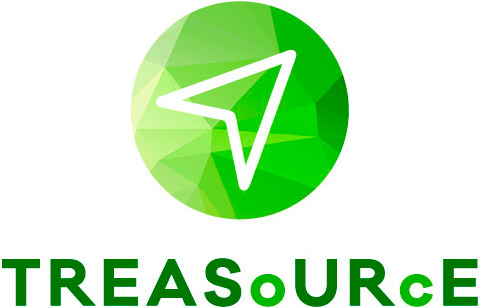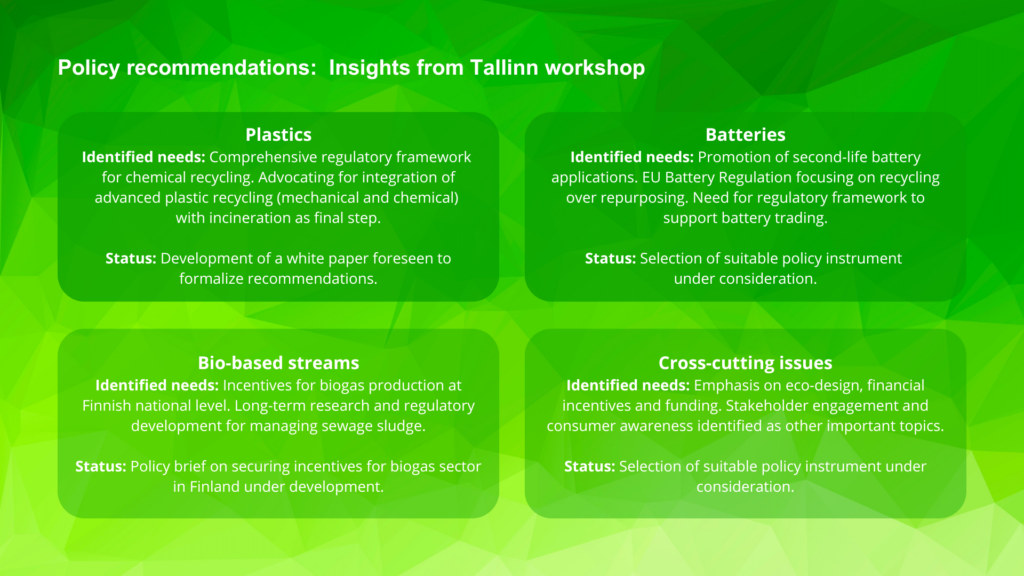The TREASoURcE project seeks to broaden understanding of the policy landscape by developing the Deliverable report D1.3, which maps regulatory framework, and identifies drivers and barriers in plastics, batteries, and biobased waste streams. As a result, this deliverable provides policy recommendations to EU and national authorities. Furthermore, a policy recommendation workshop was held at the TREASoURcE consortium meeting in Tallinn on 11th June 2024, where project partners reviewed and refined policy recommendations from their multidisciplinary approach. The aim was to identify impactful policy recommendations and formulate these into a concise policy brief or white paper for key regulatory audiences.
Mapping regulatory drivers and barriers
The D1.3 report is part of Work Package 1, which focuses on circular economy framework analysis and actions to enhance circular economy. The task includes mapping of regulations at EU, national, regional, and local levels related to the collection, treatment, and recycling of plastics, batteries, and biobased side and waste streams. This includes a thorough review of relevant regulations and standards, supplemented by stakeholder engagement workshops to identify regulatory drivers and barriers, and to validate the findings. The goal is to support the project’s key value chain demonstrations and to promote circularity from a regulatory standpoint.
Through in-depth desk research and stakeholder input, key regulatory drivers and barriers to the circular economy have been identified. For plastics, eco-modulated Extended Producer Responsibility fees, enhanced waste collection, and Eco-design Directives promote recyclability. As for batteries, the EU Battery Regulation and Digital Product Passport improve recycling and traceability. Standards for Battery Energy Storage Systems also encourage second-life battery use. In biobased streams, new fertilizer regulations support the production of biobased products and recycling in agriculture. On the other hand, regulatory challenges remain. Plastic recycling is hindered by poor design, lack of transparency, and conflicting food-contact rules. In batteries, regulations do not fully address EV battery reuse and second-life applications. In biobased streams, fragmented regulations and high compliance costs stifle innovation, particularly in using biobased materials for fertilizers.
Policy recommendations to support sustainable resource management
Based on these insights, eight policy recommendations for plastics, five for batteries, and three for biobased waste streams have been developed with practical case studies to reflect the background to formulate the policy recommendations. These recommendations focus on eco-design, material traceability, recycled content requirements, quality standards, financial incentives, stakeholder engagement, and consumer awareness, all aimed at creating a policy environment that supports sustainable resource management throughout the product lifecycle.
In conclusion, the comprehensive regulatory analysis with stakeholder validation presented in this deliverable provides a robust foundation for developing effective policies that support the transition to a circular economy. Key regulatory frameworks have been addressed, policy drivers and barriers identified, and targeted recommendations formulated, paving the way towards a sustainable and circular future for plastics, batteries, and biobased side and waste streams.
You can download the full report here.
20.09.2024 | Tran Ngo (VTT) and Nora Berglund (MTK)
For more information, contact: tran.ngo@vtt.fi

